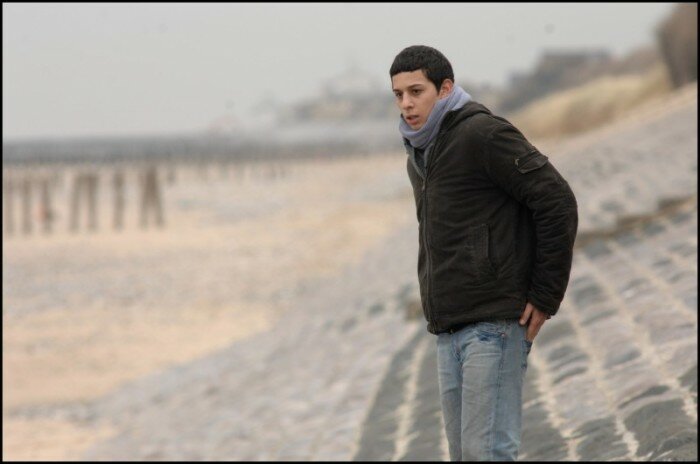If there was one issue that has appeared consistently during the turn of this millennium, it would be the issue of asylum seekers. Whether the parent is global warming, modern conflict, drugs, disaster, genocide or globalisation – the effect is almost always tied to the seeking of asylum in one way or another. The conflict between righteousness, authority and preservation of society is strong enough that some film makers have chosen to address the issue in different ways.
One of those film makers is Philippe Lioret in his multi-language feature: Welcome.
Set during the current war in Iraq, Bilal (Firat Ayverdi) is a young Iraqi refugee who desperately wants to live in England, where his beloved Mina now lives with her family. After trekking four thousand kilometers from his home in Iraq’s region of Kurdistan, we meet Bilal in France, where he finds the only obstacle between him and his girlfriend is the English Channel. Unfortunately for Bilal, this obstacle is far more complex to overcome than anyone could perceive (least of which, comfortable western-born audiences). When the simplest method of crossing, becomes the most difficult for Bilal, he decides the most difficult method would be the simplest – that is, swimming the Channel. Using his remaining Euros to teach himself at a local pool, Bilal meets Simon (Vincent Lindon), a swimming instructor who agrees to Bilal’s suspicious request for paid lessons.
Simon, a gruff individual, is going through a seemingly friendly divorce with his wife (Audrey Dana), who volunteers at a local mission. The region is full of refugees in limbo, due to its’ proximity to Britain. After an altercation, Simon’s wife forces him to rethink his complacency about their situation in such a strict anti-refugee area. Bilal soon becomes a test and a challenge for Simon’s newly spun moral compass.
This film jumps straight into the action, with such a scarce back story, it relies on pacing, obstacles and revelations to keep the interest peaked. During the first act of the film, there is a lot in this department. The desperate methods used by refugees to evade border patrol, stay clean and survive as a group are interesting elements that paint a tragic picture. Unfortunately the film looses pace at the post midway point, which is always hard redeem. There are also flaws in the films logic, like why Bilal thought swimming the Channel was a good idea, when the movie clearly shows he has problems with lung capacity during the opening scenes. Soon enough, however, with some suspension of disbelief, Bilal and Simon’s story begin to interweave and themes become clear. Even with a few pacing issues and blanks left unfilled, the plot successfully delivers a complex message about ones determination and ones reality.
In addition to the thoughtful theme of determination, Welcome has an equally interesting theme of suppression. The film portrays the legal conflict between asylum seekers and the French region as nothing less than militant. The overhanging threat of the French police and the strict (seemingly unfair) laws provides an intriguing insight into how other countries might handle refugees. If your political compass leans anywhere to the left, you might even be a little shocked.
Philippe Lioret’s direction is competent throughout Welcome and the casting is really very good. The film focuses on downplaying the characters expression, which actually adds to the intensity of certain scenes that may have seemed melodramatic otherwise. There is also the risk that this type of film will appear to be a tale of bleeding hearts, but Firat Ayverdi, Vincent Lindon and Audrey Dana are appropriately reserved, letting the action of surrounding characters and situations drive the film.
Where the direction falls short is in the presentation, while it doesn’t provoke criticism, the lack of much style to compliment the drama is a little disappointing. The shots rarely go wide enough or move through a scene (although when they do, over the channel, it looks tremendous) and the music is very repetitive. The sound design is initially complimentary of Bilal’s overwhelming position, but peters off. If there was more variation to the photography, music and sound design, the slower parts of the film could have easily been redeemed.
My criticisms, however, are only minor compared to what this film achieves in theme, insight and originality. You do need to think in this film and you need to think in the right way, but if you’re looking for something thought provoking that has a good story and isn’t over the top, the ironically titled Welcome is well worth the look.
Verdict:
Thoughtful, insightful and thankfully not overplayed, with great results.


![welcome-2009-6[1] welcome 2009 61 e1269489825704 600x271 Welcome (Review)](/wp-content/uploads/welcome-2009-61-e1269489825704-600x271.jpg)








